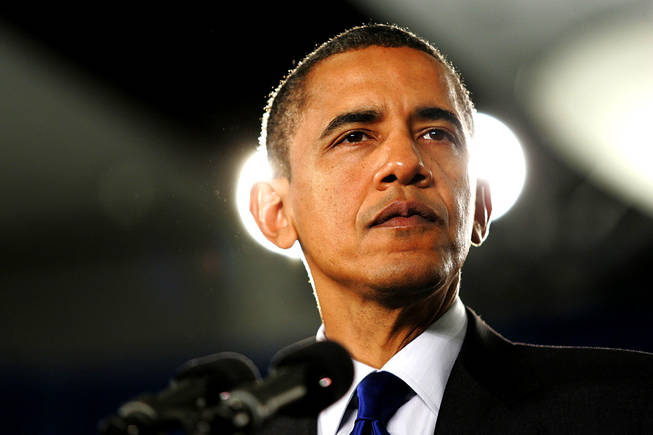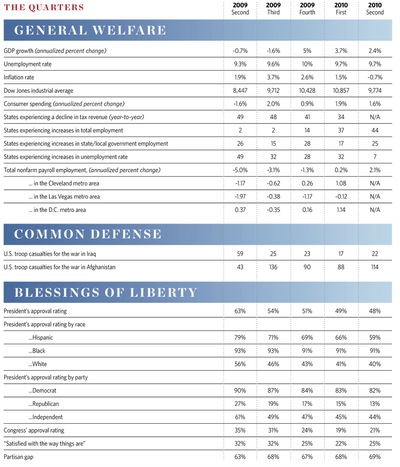
Although he scored major legislative victories over the past year, President Barack Obama’s approval rating has dropped dramatically.
Sunday, Sept. 5, 2010 | 2:01 a.m.
AN INDEX of THREE FACTORS
Bipartisanship has all but vaporized, incumbents’ approval ratings have plummeted and the nation is struggling to pull itself out of the Great Recession for which both parties are blamed. It may not be a great year for a politician to be closely linked with either the Democratic or Republican parties. That’s why the outcome of the November elections may largely be decided by independent voters. When the dust settles, our political leaders better learn to cooperate. In this fifth “How We’re Doing” index, a version of which ran recently in The Washington Post, a team of scholars at the Brookings Institution examines economic indicators, the cost of war and the president’s approval ratings to determine the nation’s general welfare.
THE ANALYSIS
Political polarization has risen, the economy is shaky and some states are on the brink of fiscal collapse. In the fifth “How We’re Doing” index, a team of scholars at the Brookings Institution has looked at the past five quarters to ascertain what factors might trigger a major shake-up in November.
It does not bode well for incumbents that as of mid-July, only 25 percent of Americans say they are satisfied with the state of the country. Political polarization remains extremely high: There is an astounding 69 percentage point difference between Republican and Democratic approval of President Barack Obama’s performance. The president’s overall approval rating has dropped 15 percentage points over the past year, and Congress’ approval rating has dropped 14 points. This striking polarization and the shift in independents’ support could be major factors in the midterm election.
Perhaps more troubling for the White House is its decline among independents; their approval of the president’s performance has fallen 17 points over the past year. Factors include the economy and failure to bridge the partisan divide. And although many have focused on the president’s decline in general popularity among white voters, his ratings among Hispanic voters have taken a comparative free fall — despite the administration’s support for immigration reform and its response to Arizona’s immigration law.
Over the past year, Obama scored major legislative victories on health care and financial reform. But polarization in Congress has stymied efforts to address pressing problems such as climate change, energy conservation, immigration and campaign-finance reform. High unemployment persists: 20 states have unemployment rates greater than 9 percent. Big portions of the country are still experiencing recessionlike conditions, which limit states’ ability to deal with housing, education and transportation issues. U.S. real gross domestic product increased at an annual rate of only 2.4 percent in the second quarter. This weak recovery makes it difficult to substantially reduce unemployment.
With 37 gubernatorial races this year, more than two-thirds of the states could have new leadership. In the face of federal inaction, states and metro areas have become the real innovators in U.S. politics. Officials in the Kansas City metro area, the Bay Area, the Puget Sound region of Washington and greater Chicago, for example, have developed collaborative plans for maximizing their Recovery Act money and state spending on energy efficiency, foreclosure responses and “green” jobs. Almost all states and municipalities are required to balance their budgets, which forces them to make pragmatic decisions on taxes and spending. They do not have the luxury of doing nothing.
The situation abroad is mixed. The president is committed to reducing the U.S. troop presence in Iraq, although violence there persists. And the war in Afghanistan troubles many Americans and had been exacerbated by troubles in Pakistan even before the recent flooding.
Overseas conflicts, the shaky U.S. economy and low trust in government make this a challenging election season for incumbents, particularly Democrats. The extremely high “partisan gap” makes it imperative for those elected to work across party lines if they hope to make big policy changes.
THE AUTHORS
This Brookings Institution analysis was prepared by Darrell West, vice president and director of Governance Studies, and William Antholis, the institution’s managing director.


Join the Discussion:
Check this out for a full explanation of our conversion to the LiveFyre commenting system and instructions on how to sign up for an account.
Full comments policy